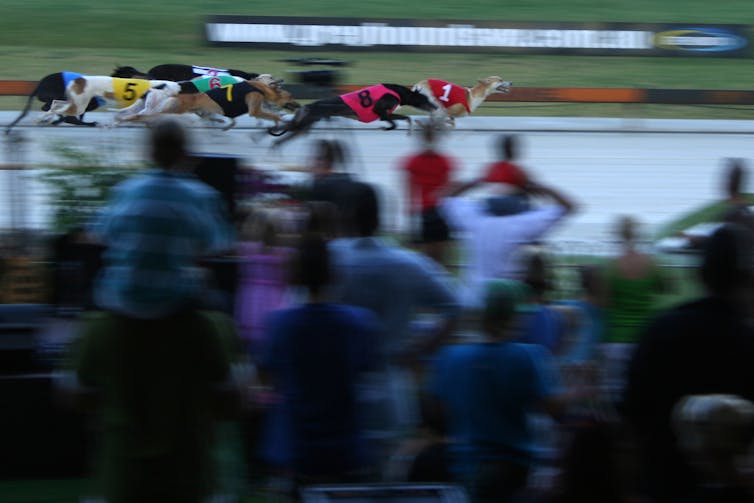
Aaron Timoshanko, Monash University and Christine Parker, Monash University
The abolition of all Queensland’s racing boards on Tuesday follows the handing down of the final report of the Queensland Greyhound Racing Industry Commission of Inquiry by Alan MacSporran, QC.
The report’s key recommendation is to establish a new statutory body to oversee the integrity of the sport, thus separating the Queensland racing industry’s integrity and commercial arms.
Queensland Premier Annastacia Palazsczuk’s abolition includes the Queensland All Codes Racing Industry Board (trading as Racing Queensland), the Greyhound Racing Board, the Harness Racing Board and the Thoroughbred Racing Board.
The inquiry and action follows evidence and allegations of live-baiting documented in an ABC Four Corners exposé. But will the Premier’s actions fix the industry’s problems?
Damning critique
In the report’s most significant finding, Racing Queensland was found to have a conflict of interest resulting from its dual responsibilities for the commercial and integrity operations of the business. This finding has potentially far reaching consequences as such a conflict arguably exists in every state and territory in Australia where racing exists.
In addition, the final report made several important findings including the failure of industry self-regulation to protect the welfare of animals entrusted in its care. The inquiry was also highly critical of Racing Queensland for failing in its duties across all three sporting codes (greyhound, harness and thoroughbred racing).
The wide-ranging recommendations made by the inquiry not only address the issue of live baiting, but also tackles other welfare issues that have plagued the industry.
In particular, the inquiry takes aim at the issue of overbreeding, wastage, licensing and the traceability of greyhounds (a third of greyhound pups born in Queensland are unaccounted for).
Winning back public confidence
The final report and a subsequent statement made by the Queensland Premier make it clear that the primary aim of the inquiry is to restore public confidence in the racing industry. This is rightfully seen as a necessary pre-condition for the industry to be considered legitimate in the eyes of the public.
The inquiry hopes to achieve this aim through recommendations that promote the integrity of the industry and by safeguarding animal welfare. Public confidence can only be restored once these issues have been addressed.
In this regard, the live baiting of greyhounds is a rather unique issue as animal welfare and integrity overlap due to the perceived competitive advantage blooded greyhounds possess.
In fact, this may explain why live baiting has received such a strong response from the industry and state governments, whereas the issue of wastage has largely been ignored for years.
The integrity commission
The failure of Racing Queensland to effectively assess and manage risk across all three codes led the inquiry to recommend the creation of a new independent statutory authority, the Queensland Racing Integrity Commission (QRIC).
According to the inquiry, the QRIC is to be led by the existing role of Racing Integrity Commissioner who will be accountable directly to the Minister for Sport and Racing. The proposed responsibilities of the QRIC far exceed those fulfilled by the current racing Commissioner.
The QRIC is to be independent of Racing Queensland and the department. The majority of the members on the board of QRIC will also need to be independent of the racing industry for two years prior to their appointment.
The QRIC will be responsible for integrity and animal welfare issues, leaving Racing Queensland to focus on the commercial aspects to its business. In doing so, the Inquiry aims to redress Racing Queensland’s conflict in performing both the integrity and commerciality functions.
It all depends on funding
Given the stated aim of restoring public confidence in the industry, one may have expected greater discussion of the QRIC’s role in safeguarding animal welfare.
To be fair, the proposed QRIC will:
- use some of the resources of the Queensland Police Taskforce
- ensure adequate welfare arrangements for retired greyhounds, through the partial refund of a licensing fee
- take a “stronger emphasis on detection and response”.
But, greater emphasis on animal welfare may help to reassure the public that welfare will remain the primary focus, rather than integrity more broadly. After all, the public outrage after the ABC’s Four Corners program aired was in response to the horrific animal cruelty, not any concern that their flutter went on a race where one or more dogs had an unfair advantage.
Short of banning the sport, the creation of the QRIC is likely to be a positive step for the welfare of greyhounds. Separating the integrity and commercial operations of the industry will certainly help eliminate the conflict between drawing the crowds and the welfare of greyhounds.
Ultimately, the success of this recommendation will depend on the personnel staffing the new QRIC and its ability to secure adequate funding. These challenges are acknowledged by MacSporran and they cannot be understated.
Securing adequate funding for the QRIC may not be an issue in the short-term, but what happens when the media attention has moved on? Can we trust that the QRIC will be sufficiently funded even in a tight budget?
History would suggest not. According to the inquiry, the current funding of the Racing Integrity Commissioner’s role on a part-time basis was “inadequate” and “meagre”. How will the QRIC be any different?
![]() Only time will tell.
Only time will tell.
Aaron Timoshanko, Sessional Academic and Research Assistant at Flinders University, PhD Candidate, Monash University and Christine Parker, Professor of Regulatory Studies and Legal Ethics, Monash University
This article was originally published on The Conversation. Read the original article.